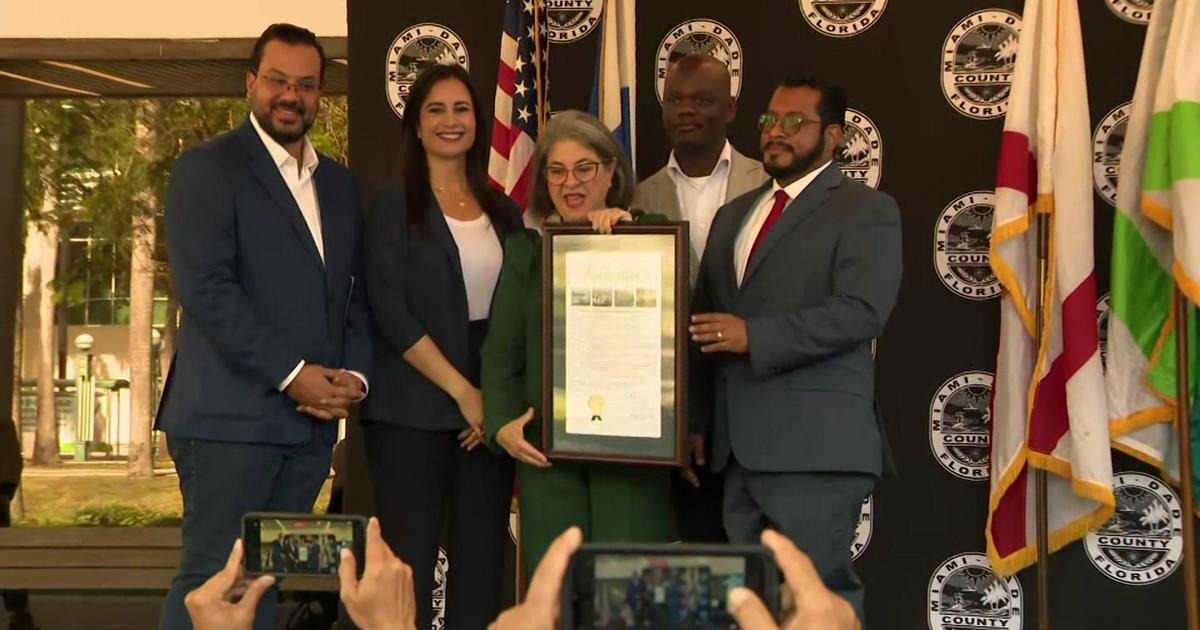Rubio Encouraged By Immigration Reform Talks
MIAMI (CBSMiami) – MIAMI (CBSMiami) – One day after union groups and business representatives agreed to a temporary-worker program, Sen. Marco Rubio (R-FL) said he was encouraged by the progress being made in talks on immigration reform.
The AFL-CIO and the pro-business U.S. Chamber of Commerce reached a deal late Friday that would allow tens of thousands of low-skill workers into the country to fill jobs in construction, restaurants and hotels. Yet despite the unusual agreement between the two powerful lobbying groups, lawmakers from both parties tried to curb expectations that the negotiations were finished and an immigration bill was heading for a vote.
"I'm encouraged by reports of an agreement between business groups and unions on the issue of guest workers. However, reports that the bipartisan group of eight senators have agreed on a legislative proposal are premature," said Rubio in a statement released Sunday morning.
Lawmakers will be closely watching any deal for Rubio's approval and his skepticism about the process did little to encourage optimism. Coming to some sort of agreement on a temporary-worker program has been one of the biggest remaining hurdles for the Senate negotiators.
"We have made substantial progress, and I believe we will be able to agree on a legislative proposal that modernizes our legal immigration system, improves border security and enforcement and allows those here illegally to earn the chance to one day apply for permanent residency contingent upon certain triggers being met. However, that legislation will only be a starting point," said Rubio.
Sen. Chuck Schumer, (D-N.Y.), helped negotiate the deal between AFL-CIO president Richard Trumka and Chamber of Commerce head Tom Donohue during a late-Friday phone call.
Under the compromise, the government would create a new "W'' visa for low-skill workers who would earn wages paid to Americans or the prevailing wages for the industry they're working in, whichever is higher. The Labor Department would determine prevailing wage based on customary rates in specific localities, so that it would vary from city to city.
The detente between the nation's leading labor federation and the powerful business lobbying group still needs senators' approval, including a nod from Sen. John McCain, the Arizona Republican whose previous efforts came up short.
The measure also under serious discussion would secure the border, crack down on employers, improve legal immigration and create a 13-year pathway to citizenship for the millions of illegal immigrants already here.
Schumer acknowledged on Sunday that the lawmakers themselves had not settled on a final deal and said the senators have not yet finished writing a bill to address the 11 million illegal immigrants already in the United States.
"Business and labor have an agreement," Schumer said. "This is a major, major obstacle that is overcome."
Rubio said the eight Senators working on this bill see it as a starting point and he would like to see more public debate and other Senators come up with amendments to improve the legislation.
"Arriving at a final product will require it to be properly submitted for the American people's consideration, through the other 92 senators from 43 states that weren't part of this initial drafting process," said Rubio. "In order to succeed, this process cannot be rushed or done in secret."
Immigration reform is a major second-term priority of President Barack Obama's and would usher in the most dramatic changes to the faltering U.S. immigration system in more than two decades.
"This is a legacy item for him. There is no doubt in my mind that he wants to pass comprehensive immigration reform," said David Axelrod, a longtime political confidant of Obama.
During the last week, an immigration deal seemed doomed. But the breakthrough late Friday restarted the talks.
Ultimately the new "W'' visa program would be capped at 200,000 workers a year, but the number of visas would fluctuate, depending on unemployment rates, job openings, employer demand and data collected by a new federal bureau being pushed by labor groups as an objective monitor of the market, according to an official involved with the talks who also spoke on condition of anonymity ahead of a formal announcement.
A "safety valve" would allow employers to exceed the cap, the official said, if they could show need and pay premium wages, but any additional workers brought in would be subtracted from the next year's cap.
The workers could move from employer to employer and would be able to petition for permanent residency and ultimately seek U.S. citizenship. Neither is possible for temporary workers now.
"As to the 11 million (illegal immigrants), they'll have a pathway to citizenship, but it will be earned, it will be long, and it will be hard, and I think it is fair," said Sen. Lindsey Graham, R-S.C.
The new program would fill needs employers say they have that are not currently met by U.S. immigration programs. Most industries don't have a good way to hire a steady supply of foreign workers because there's one temporary visa program for low-wage nonagricultural workers but it's capped at 66,000 visas per year and is only supposed to be used for seasonal or temporary jobs.
Separately, the new immigration bill also is expected to offer many more visas for high-tech workers, new visas for agriculture workers, and provisions allowing some agriculture workers already in the U.S. a speedier path to citizenship than that provided to other illegal immigrants, in an effort to create a stable agricultural workforce.
(TM and © Copyright 2013 CBS Radio Inc. and its relevant subsidiaries. CBS RADIO and EYE Logo TM and Copyright 2013 CBS Broadcasting Inc. Used under license. All Rights Reserved. This material may not be published, broadcast, rewritten, or redistributed. The Associated Press contributed to this report.)



